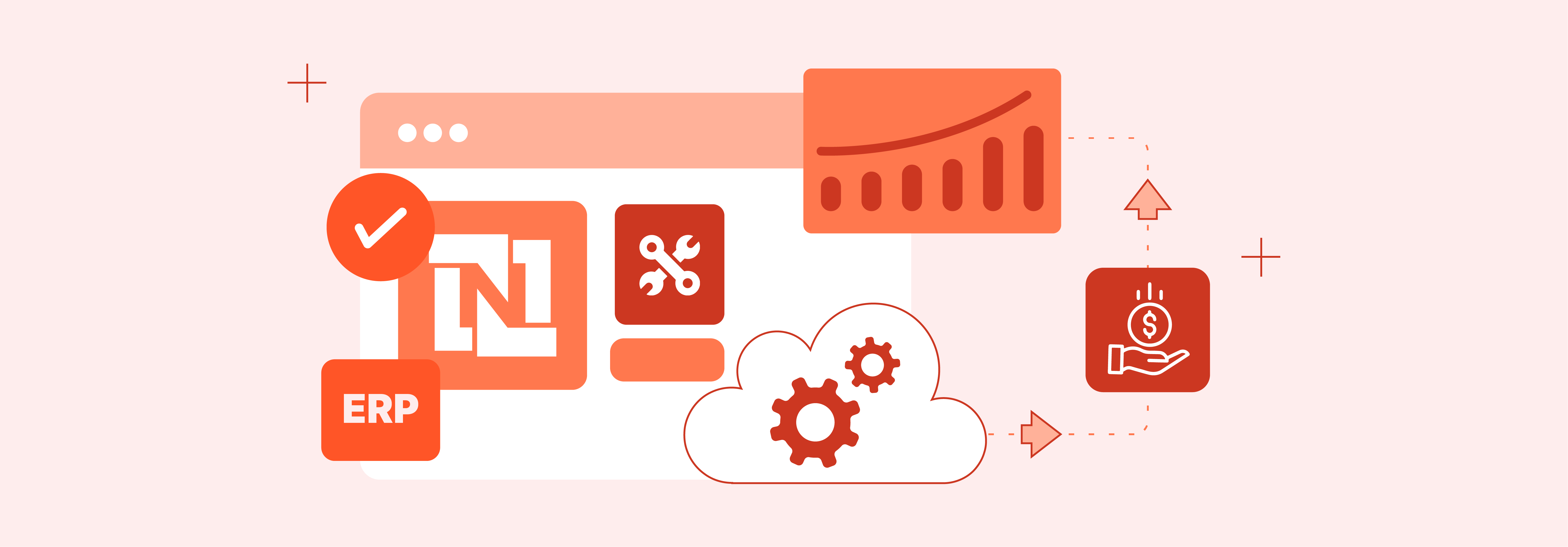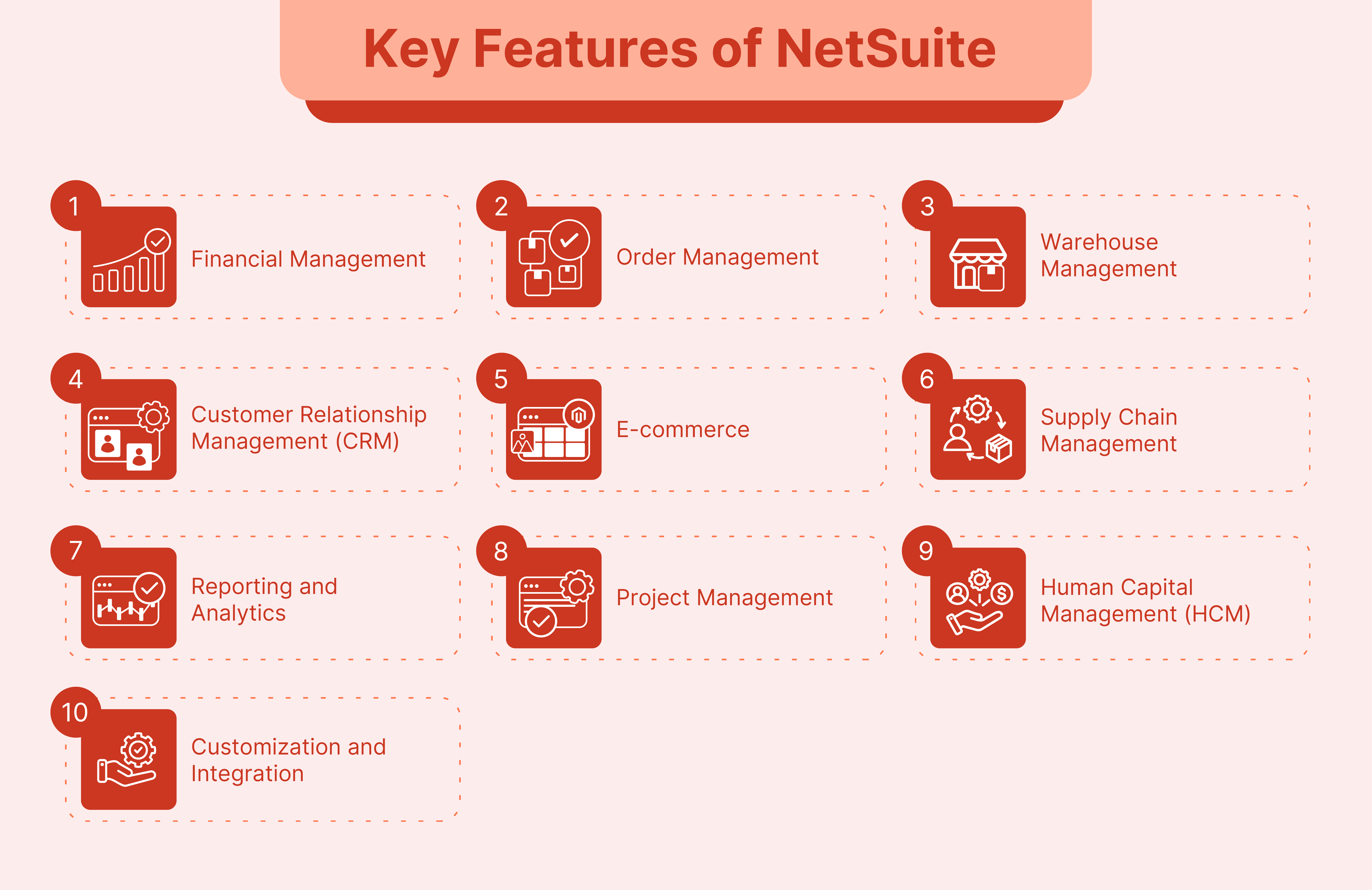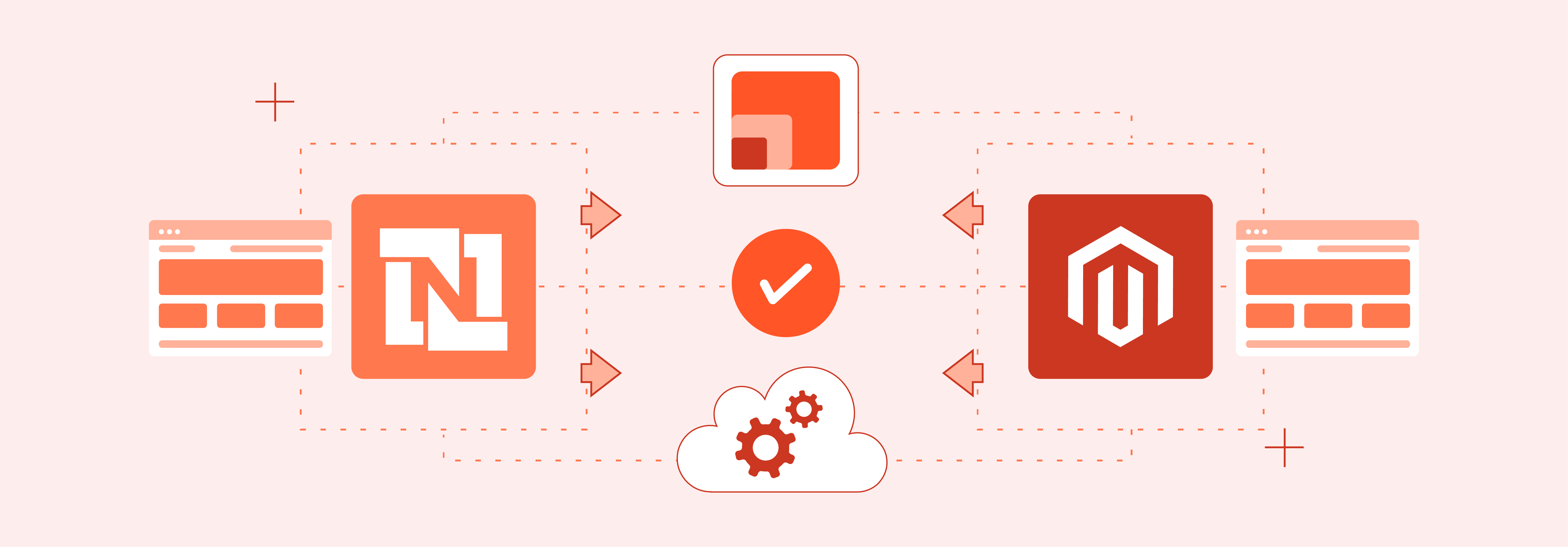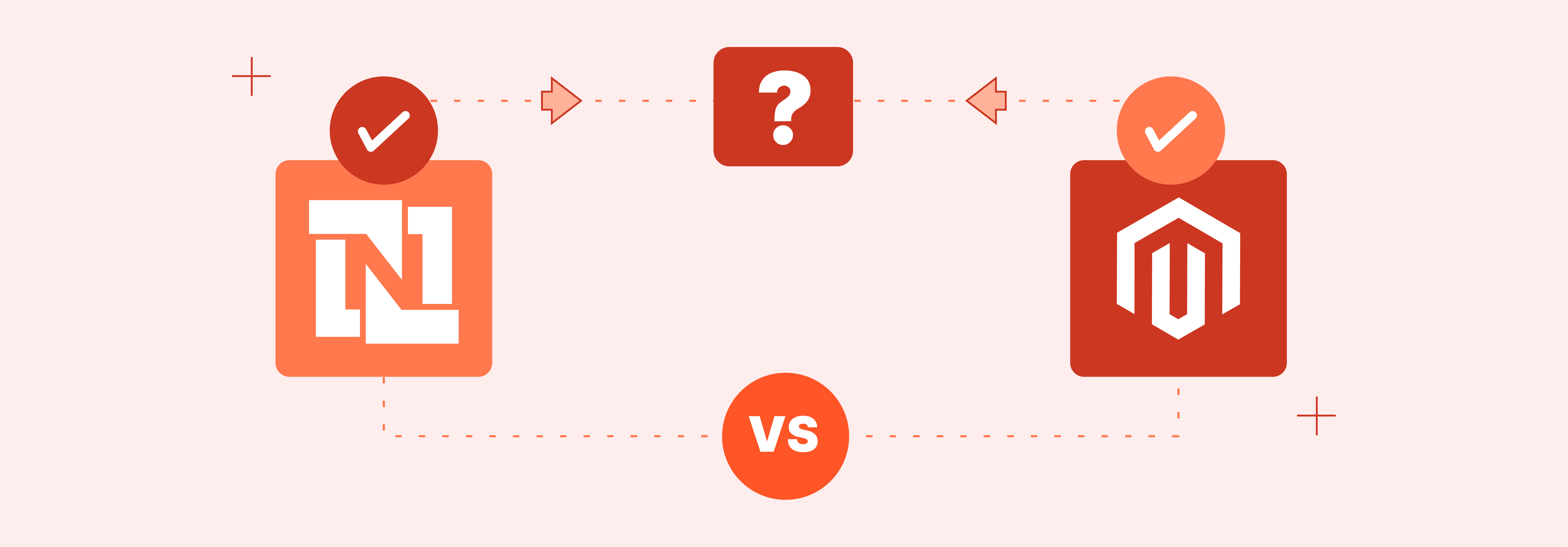
NetSuite vs Magento: Similarities and Differences
Confused with a comprehensive ERP solution or an ecommerce solution for your business? Compare NetSuite vs Magento for features and scalability to make an informed decision. In this article, we will explore the similarities and differences between NetSuite and Magento.
Key Takeaways
-
Understand the differences between NetSuite and Magento for informed decision-making.
-
Discover the similarities between NetSuite and Magento in terms of e-commerce capabilities and support.
-
Learn how to assess your business requirements, industry needs, and customization preferences.
-
Consider factors such as scalability, budget, user experience, and vendor reputation.
-
Make an informed choice based on your business goals, growth plans, and long-term flexibility.
What is NetSuite?

NetSuite is a cloud-based enterprise resource planning (ERP) software suite. It is designed to help businesses manage their financials, operations, and customer relations.
It is particularly popular among mid-sized and growing businesses due to its scalability and flexibility. Being cloud-based, it offers the advantage of:
-
Accessibility from anywhere with an internet connection
-
The provider handles regular updates and maintenance.
It frees up businesses from the need for extensive IT infrastructure and maintenance. Oracle acquired NetSuite in 2016, further boosting its capabilities and market reach.
Key Features of NetSuite

1. Financial Management
NetSuite integration provides tools for managing financial processes, such as:
-
General ledger
-
Accounts payable
-
Accounts receivable
-
Billing
-
Fixed assets
-
Financial reporting.
2. Order Management
The Netsuite Suitecommerce advanced features help businesses streamline order-to-cash processes. These include:
-
Order capture
-
Revenue recognition.
3. Warehouse Management
NetSuite enables businesses to:
-
Optimize inventory levels
-
Track stock movements
-
Manage warehouses
-
Streamline procurement processes.
4. Customer Relationship Management (CRM)
NetSuite's CRM module allows businesses to:
-
Manage customer interactions
-
Track leads and opportunities
-
Automate sales processes
-
Provide customer support.
5. E-commerce
NetSuite includes e-commerce capabilities for:
-
Creating and managing online stores
-
Integrating with back-office systems.
It provides a seamless customer experience.
6. Supply Chain Management
NetSuite helps businesses optimize supply chain operations. It involves planning and sourcing to manufacturing and distribution. It provides visibility into:
-
Inventory levels
-
Supplier performance
-
Demand forecasting.
7. Reporting and Analytics
NetSuite offers powerful reporting and analytics tools for generating:
-
Financial reports
-
Operational dashboards
-
Key performance indicators (KPIs).
It helps monitor business performance and make data-driven decisions.
8. Project Management
NetSuite's project management module allows businesses to plan, track, and manage projects. It includes:
-
Resource allocation
-
Task management
-
Time tracking
-
Business management.
9. Human Capital Management (HCM)
NetSuite includes features for managing human resources processes, such as:
-
Employee data management
-
Payroll processing
-
Benefits administration
-
Workforce planning.
10. Customization and Integration
NetSuite Suitecommerce provides customization options and integration capabilities. These tailor the software to specific business needs and integrate with third-party applications and systems.
Similarities Between NetSuite and Magento

1. E-commerce Capabilities
Both NetSuite and Magento offer ecommerce functionalities. NetSuite includes e-commerce features as part of its broader ERP suite. Magento is a unified platform for e-commerce businesses. Both platforms enable businesses to:
-
Create and manage online stores
-
Handle product catalogs
-
Process orders
-
Manage customer interactions.
2. Integration Capabilities
Both NetSuite and Magento provide integration capabilities to connect with other systems and third-party applications. They offer APIs and tools for integrating with:
-
CRM systems
-
Accounting software
-
Other business applications.
3. Customization Options
Both platforms offer customization options to tailor the software to specific business requirements. NetSuite allows for customization of ERP suites:
-
Workflows
-
Forms
-
Reports
-
Dashboards.
Magento offers extensive customization options for designing and developing:
-
Integrations.
It enhances the functionality of e-commerce stores.
4. Scalability
Both NetSuite and Magento are designed to scale with the business. These can accommodate the needs of growing businesses including:
-
Handling increased transaction volumes
-
Expanding product catalogs
-
Supporting multiple sales channels.
5. Cloud-Based Deployment
NetSuite and Magento are available as cloud-based solutions. They offer the advantages of:
-
Accessibility
-
Scalability
-
Ease of maintenance.
Businesses can access the software from any location with an internet connection. They can also benefit from automatic updates and maintenance provided by the vendors.
Differences Between NetSuite vs Magento
| NetSuite | Magento | |
|---|---|---|
| Scope | NetSuite is a comprehensive cloud-based ERP software suite. | Magento is a specialized e-commerce solution. |
| Focus | It is designed to manage various aspects of business operations. | It is focused solely on providing powerful solutions for online retail businesses. |
| Hosting | These websites only use cloud-based hosting. | These websites can use both self-hosted and cloud-based hostings. |
| Support | NetSuite Suitecommerce offers customer support, training, and consulting services. It provides online resources, user forums, and community support. | It provides community support through forums, documentation, and user-contributed resources. It offers third-party agencies and developers for implementation, upgrade, customization, and support. |
| Target Audience | It is suitable for businesses needing comprehensive solutions. | It is suitable for businesses focusing solely on e-commerce. |
How to Choose Between NetSuite vs Magento?

1. Understand Your Business Requirements
Evaluate your business processes and identify the key functionalities you need. Consider aspects such as:
-
Financial management
-
Inventory management
-
CRM
-
Ecommerce
-
Scalability.
2. Consider Your Industry and Business Model
Different industries and online business models have unique requirements. Determine whether you need a comprehensive Netsuite ERP solution. These cover various business functions or a specialized e-commerce platform like Magento. These focus solely on online retail.
3. Assess Customization Needs
Determine the level of customization required for your business. You should assess whether you need extensive customization options to tailor the software to your specific needs. Consider whether NetSuite's flexibility or Magento's customizable ecommerce features better align with your requirements.
4. Evaluate Integration Capabilities
Assess the integration capabilities of both platforms. Consider how well they integrate with your existing systems and third-party applications. Determine whether NetSuite's powerful integration capabilities or Magento's extensive integration options better meet your integration needs.
5. Scalability Requirements
Consider your business's growth plans and scalability requirements. Determine whether NetSuite's scalability features or Magento's ability can better align with your scalability needs to handle:
-
High traffic volumes
-
Large product catalogs
-
Complex e-commerce operations.
6. Budget and Total Cost of Ownership (TCO)
Evaluate both NetSuite and Magento’s costs of:
-
Implementation
-
Licensing
-
Customization
-
Maintenance
-
Ongoing support.
Consider your budget constraints. It helps determine which platform offers the best value for your investment over the long term.
7. User Experience and Ease of Use
Consider the user experience and ease of use of both platforms for your team members and customers. Evaluate the:
-
Usability of the interfaces
-
Availability of training and support resources
-
Overall user satisfaction.
8. Consult with Stakeholders
Involve key stakeholders in the decision-making process, including:
-
Business leaders
-
IT professionals
-
End-users.
Gather input and feedback from different departments. It helps ensure that the chosen platform meets the needs of all stakeholders.
9. Evaluate Vendor Reputation and Support
Research both Netsuite Suitecommerce and Magento vendors:
-
Reputation
-
Track record
Evaluate the quality of services offered by the vendors. These include:
-
Customer support
-
Training
-
Ongoing maintenance.
10. Consider Future Growth and Flexibility
Anticipate future business growth and expansion opportunities for your business. Determine whether NetSuite's comprehensive suite of features or Magento's focus on e-commerce. You should choose the one that provides the flexibility and scalability needed to support your long-term business goals.
FAQs
1. How does Magento optimize the shopping cart checkout experience?
Magento provides extensive optimization options for the shopping cart and checkout process. It ensures an efficient checkout experience with real-time inventory updates and payment integration.
2. What troubleshooting options are available for Magento's PHP-based platform?
Magento's PHP-based platform offers powerful troubleshooting capabilities. Extensive documentation, user forums, and community support available offer it.
3. How does NetSuite manage real-time data?
NetSuite's cloud-based ERP suite facilitates real-time data management across financials, operations, and customer relations. It ensures up-to-date insights for informed decision-making.
4. How does NetSuite support POS operations compared to Magento?
NetSuite offers powerful POS capabilities as part of its comprehensive ERP suite. It integrates smoothly with various retail channels. Magento focuses primarily on e-commerce. It may require additional extensions or integrations for POS functionality.
Summary
NetSuite vs Magento, compare their features and scalability to make an informed decision. The article also uncovers several other points, including:
-
Both platforms share similarities, such as e-commerce capabilities, integration options, and flexibility.
-
Both platforms differ in scope, focus, hosting options, and support structures.
-
NetSuite caters to businesses needing comprehensive solutions, while Magento targets those concentrating on e-commerce.
-
The structured approach involves evaluating business requirements and industry alignment.
Ready to select between NetSuite's comprehensive ERP or Magento's specialized e-commerce? Optimize your online store with managed Magento hosting.



